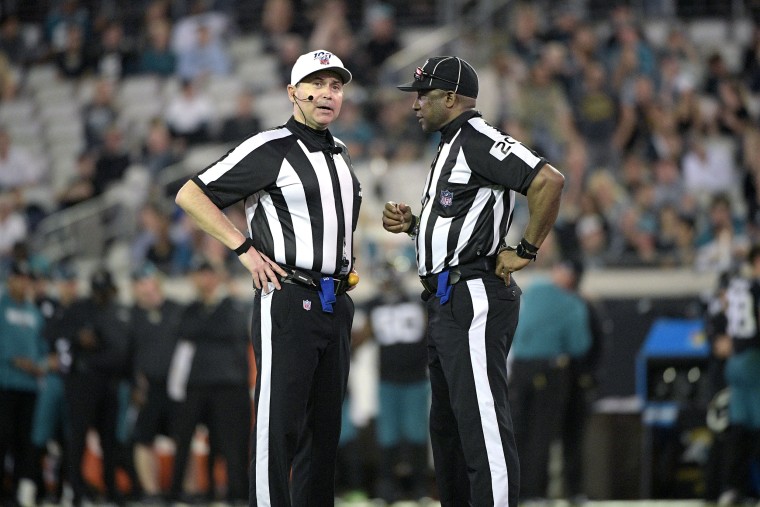When the officiating crew takes the field for Super Bowl 2020 in Miami on Sunday, they will make history before the coin toss. Five of its seven members are African American, the most not only for a Super Bowl but for any NFL game.
The moment comes as the league is under criticism for the lack of minorities hired as head coaches. Five coaching jobs became available after the regular season, and only one minority was hired — Ron Rivera, who is of Puerto Rican and Mexican descent, with the Washington Redskins.
In the 32-team league, he joins three other minority head coaches, all of whom are black: Mike Tomlin of the Pittsburgh Steelers, Brian Flores of the Miami Dolphins, and Anthony Lynn of the Los Angeles Chargers.
The NFL has 122 officials, according to the NFL’s website. Thirty-four are black, or about 28 percent. This in a league where nearly 70 percent of players are black.
The NFL assigns referees to playoff games based on a review of regular season games, then makes Super Bowl assignments based on the same reviews and playoff performance.
“These officials are the very best in the world with exemplary on-field performance, leadership and excellence that far exceeds the established criteria, and truly demonstrates the power of diversity and inclusion in this great game,” Troy Vincent, executive vice president of football operations for the NFL, said in a statement.
The five African American officials working Sunday’s game are: line judge Carl Johnson; side judge Boris Cheek; field judge Michael Banks; back judge Greg Steed; and umpire Barry Anderson. The other two are Bill Vinovich, referee and head of the crew; and Kent Payne, down judge. (The replay official, Mike Chase, is not on the field).
All five have years of experience as NFL officials: Johnson has 16 years; Cheek 24; Banks 18; Steed 17; and Anderson 13. All have worked the Super Bowl before, although it will be Anderson’s first on-field appearance. (He was an alternate once before.)
“I am so proud of the African American officials who are working the Super Bowl,” said C. Keith Harrison, an associate professor in Sports Business Management at the University of Central Florida, who has co-written research for the NFL on diversity and mobility in the hiring of coaches and coordinators.
“The numbers are telling. The league uses true metrics to make the decisions. And the best among the league’s officials are justifiably rewarded.”
Harrison said that is not always the case for coaches.
“What the difference in outcomes between hiring coaches and rating officials is that if you are an official, you pay your dues, and your performance is measured by measures that are static,” he said. “If you are among the best, you are rewarded. With the coaches, what is required to get hired changes yearly. No one really knows what attributions teams are looking for in top coaching positions.”
NFL rules prohibit officials from doing interviews until after the regular season and playoffs end.
But one former NFL official said that while the makeup of the officiating crew on Sunday was a sign of progress, change has been a long time coming.
Larry Hill, who is African American and retired in 1992 after 18 years, said the league only hired its first black on-field official, Burl Toler, in 1965. The second came three years later, and the third in 1969.
“Our numbers took years to really improve,” said Hill, who worked the Super Bowl in 2004 as the replay official. “They stayed basically the same for a while. To see the lineup in this game makes me proud.”
